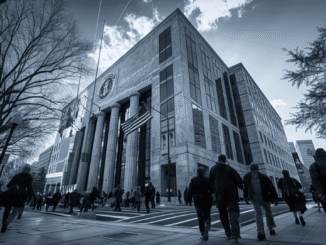
SEC Considers Easing Tokenized Securities Rules
The U.S. Securities and Exchange Commission (SEC) is mulling rule amendments that would dramatically streamline the path to issuing tokenized securities, and in the process introduce a more crypto-friendly environment for blockchain innovators. In a speech published on May 8, SEC Commissioner Hester Peirce stated that the agency is seriously considering issuing an exemptive order for selling securities on the blockchain.
The relief would provide temporary relief on a targeted level from certain registration obligations for businesses that use blockchain to issue, trade, and settle securities. Peirce opined this exception could include private companies along with decentralized finance (DeFi) platforms piloting blockchain-native financial instruments.
Perhaps the most important aspect of the proposal is decentralized exchanges (DEXs), which have been in legal limbo for years. In the proposed exemption, DEXs could be exempted from being registered as national securities exchanges, clearing agencies, or broker-dealers. This would save them a substantial amount of money and reduce their legal expenses while providing developers and users with more legal certainty.
Peirce explained that the majority of existing regulations are out of date and poorly suited to digital asset economies. “Businesses shouldn’t need to go through unapt rules, that were written in many cases a long time ago before the technologies being experimented upon existed and may be rendered obsolete by aspects of that technology,” she said in the speech.
The SEC has been more aggressive in the past, sending Wells notices — official notices of potential enforcement action — to exchanges like Uniswap. These cautioned that trading without registration as an exchange may be securities law violations. No charges were filed against Uniswap.
Exemptions With Guardrails
Although the potential exemption could alleviate regulatory pressure, it would not grant companies carte blanche. Peirce emphasized that any relief would not be unlimited. Companies would still be under the purview of anti-fraud provisions and other core protection against market manipulation. In addition, certain disclosure and recordkeeping requirements may still remain to give protection to investors.
This approach is echoed in models in traditional finance, where certain exemptions are provided to encourage innovation, as long as basic levels of transparency and accountability are observed.
A Sharp Shift in Crypto Policy
The proposal also comes after a broader policy change under new SEC leadership. President Biden’s previous Chair, Gary Gensler, had overseen the agency in a robust effort against the crypto industry, filing over 100 enforcement actions against companies that were purportedly violating securities laws.
But since President Donald Trump returned to the office last January, the SEC has been more conservative. Trump-appointed Chair Paul Atkins, who was sworn in on April 21, has stated that the agency would look to clarify — and constrain — its regulatory scope on digital assets.
In February, the SEC issued guidance clarifying memecoins, when explicitly labeled as speculative investments with no intrinsic value, are outside the definition of a security under the Howey Test. In April, it issued further clarification in the guise of guidance indicating U.S. dollar-pegged stablecoins used only for payment purposes also fall outside the agency’s jurisdiction.
Looking Ahead
If approved, the exemptive order would be a landmark in bringing regulatory policy into alignment with the reality of blockchain technology. Although no decisions have been reached, Peirce’s address indicates that the agency is poised to be more constructive in its interaction with innovators in the digital asset space.
Stakeholders all across the crypto ecosystem will be watching closely as the SEC acts. For those companies operating along the complex cross-section of securities law and blockchain, this is potentially a widely-desired regulation milestone.




